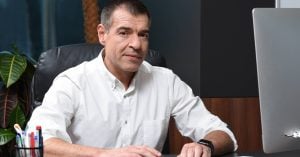When they are not working on developing and improving their products, what keeps tech leaders occupied? From managing big data including threats from cybersecurity attacks and online frauds, to finding, attracting, and retaining tech talent, as well as building infrastructure to support hybrid work, tech leaders have their hands full. The Recursive took a sneak peek at regional tech leaders’ agenda. Three modern challenges emerged as top priorities: cybersecurity and fraud, talent shortage and new working models, and sustainability. See how tech leaders and experts tackle these topics – and how you can, too.
#1 Managing online threats from cyber attacks to cyber frauds
Cybersecurity incidents and online fraud have continued to soar in 2021, exposing the dark side of digitalization and IoT, and throwing a dark cloud over our digital future. No wonder cybersecurity has climbed its way up on tech leaders’ agenda. The easiest targets of attacks such as ransomware (Ed.note where your access to data is blocked and a ransom is demanded) are organizations without cybersecurity programs, which is more often the case with small businesses with constrained budgets.
“The first thing to do that usually doesn’t cost anything is a two-factor authentication. It’s a genuinely good idea to have one, regardless of whether you have any sensitive data or not. Two factor authentication doesn’t make you immune to many attacks, but it makes you a much more difficult target. And cybercriminals prefer easy targets,” advised Bozhidar Bozhanov, the former founder of LogSentinel, a provider of cybersecurity solutions to protect against data breaches and insider attacks.
Furthermore, the boom in online training, for instance, has encouraged the rise of fraudulent training providers, who sell courses without official accreditation. For PeopleCert, the Greek unicorn offering assessment and certification of professional skills to organizations worldwide, this constitutes a threat which requires special attention and resources:
“Within the PeopleCert Quality Team, we have set up a new team for IP management and infringement, solely focused on dealing with this issue. This means we are better equipped to take a proactive approach, identify issues, and act. The team is being bolstered with additional members to ensure we’re assertive with wrongdoing and able to take legal action when necessary,” the PeopleCert team tells us. With the help of an independent, global agency, they also conduct mystery shopping exercises, to pinpoint fraudulent providers.
Another goal for PeopleCert is to educate the community – both corporates and professionals – about the importance of accredited training and certification, to help minimize fraud in the sector and ensure customers get what they pay for.
This is consistent with what experts consider should lie at the center of a cybersecurity strategy: the human dimension. Decision-makers need to understand the phenomenon and the risks it brings. We are better equipped to observe attempts at fraud if we are aware of the risks and trained to respond.
#2 Addressing emerging HR trends: talent shortage and new work models
There is a key ingredient for any business, regardless of the stage or size. People.
“When you build a startup and try to make it fly, the key ingredient, aside from the bright idea, is the people you get around to make it happen. So, among our key priorities for 2022, as we scale up and grow internationally, I would mention finding and attracting the right talent, from tech and not only,” Mircea Stan, founder and CEO of Romanian integrated delivery management platform Postis, tells The Recursive.
The HR sector is undergoing a period of rapid transformation. Across the world, factors such as rising costs of living, wage stagnation, and an unfolding global pandemic, brought new work models and preferences. The Great Resignation phenomenon built up on top of a reprioritized desire for flexibility and alignment with personal values. Remote and hybrid working emerged as the new norm.
For local companies this translates to additional competition, as skilled talent can now work for international projects from home, Mircea Stan notes. How are startups and small companies coping?
“We paid a lot of attention to bringing in people with different skills and experiences that enrich the overall team, but with the right values and similar attitudes towards our common goal. During the pandemic, we kept our office open and, even if they could have worked remotely, most of our people came and worked shoulder-by-shoulder, keeping the team close. And, most importantly, we were transparent all along, from recruitment with the salary and benefits package communicated right, to the way we involve everybody and build our company,” Mircea Stan tells us.
Furthermore, digital transformation across industries and the rapid growth of the software development sector have increased the need for trained IT talent.
“Finding talent, especially in countries where the tech industry has not been a priority for development until recent years, is difficult. With the high demand for developers and limited number of experienced engineers, companies and agencies have faced very low retention rates,” Lorena Gjana, COO of Albanian startup division5 shares with The Recursive.
Companies have responded with frequent and high wage increases, investment in team culture, and employee-centric policies, including by introducing hybrid or remote work options. Yet these efforts by themselves do not address the tech talent shortage.
“Division5 has worked hard to build partnerships with actors and universities to build up talent and expand the developers community in Albania by offering internship programs, knowledge sharing activities, and training in specific technologies,” Lorena Gjana adds.
#3 Looking at sustainability like an opportunity, not a risk
Most future-oriented tech leaders know by now that how they think about the impact of their business in relation to all important stakeholders – including the planet – is crucial for the survival of the company. Sustainability has infiltrated leadership agendas, sometimes setting into motion entire business transformation plans.
Working with the latest technologies in recycling, Romanian company Green Group recently shared with us a few best practices to follow when implementing sustainability and transformation plans. Such a process should start with identifying the “North Star” vision of the business, or where it aims to go, and continue with aligning the organization towards that vision. A zero-based approach is desirable to reach the “North Star”, yet also requires more effort and dedication at the start to leave aside the existing setup and start from scratch with new impact goals in mind.
One other company that has successfully transformed its business model around sustainability considerations is Romanian-based biodegradable packaging producer Promateris. While there is no one-size-fits all recipe, all leaders must start from the perception of sustainability as an opportunity, and not a risk. It’s equally important to look both outside, at what other companies are doing and what options exist on the market, and inside the business, to understand what impact market changes will bring and what can be done better.
Finally, a helpful concept to guide sustainability strategic planning process is materiality. A material issue is one on which a company has a substantial impact, or which can substantially affect the company. Digitalization, for instance, can offer a way to lower resource use and the overall carbon footprint.








